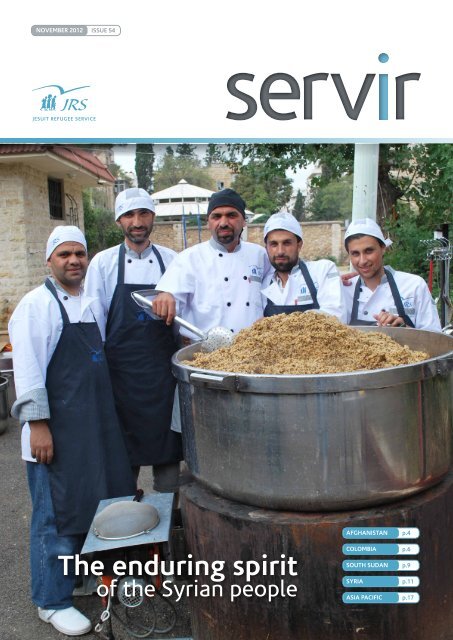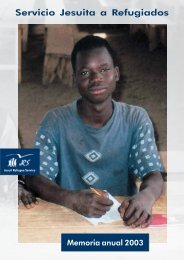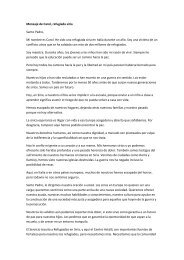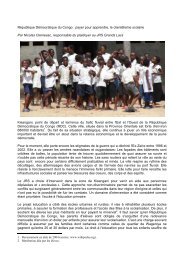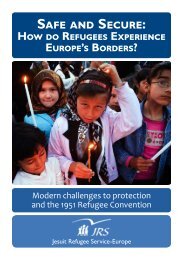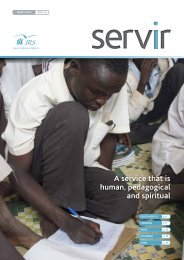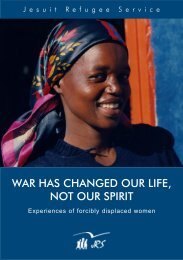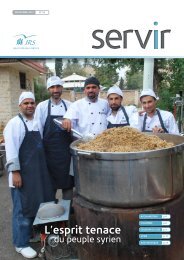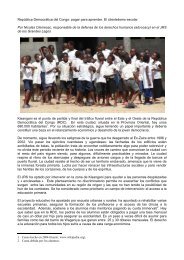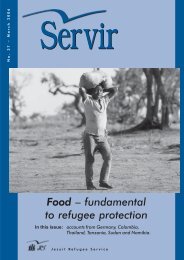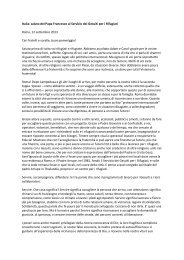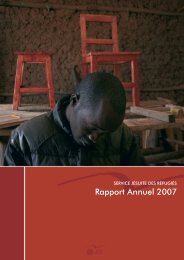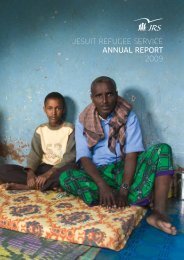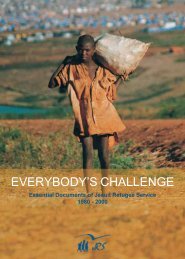Create successful ePaper yourself
Turn your PDF publications into a flip-book with our unique Google optimized e-Paper software.
NOVEMBER 2012<br />
ISSUE 54<br />
JESUIT REFUGEE SERVICE<br />
The enduring spirit<br />
of the Syrian people<br />
AFGHANISTAN<br />
COLOMBIA<br />
SOUTH SUDAN<br />
SYRIA<br />
ASIA PACIFIC<br />
p.4<br />
p.6<br />
p.9<br />
p.11<br />
p.17
<strong>Jesuit</strong> <strong>Refugee</strong> <strong>Service</strong><br />
ISSUE 54<br />
NOVEMBER 2012<br />
COVER PHOTO<br />
The JRS field kitchen team in Aleppo,<br />
Syria (Avo Kaprealian and Sedki Al<br />
Imam/JRS)<br />
in this issue:<br />
Editorial<br />
Faith and protection 3<br />
Servir is available free in English,<br />
Spanish, French and Italian. It is<br />
published twice a year by the <strong>Jesuit</strong><br />
<strong>Refugee</strong> <strong>Service</strong> (JRS).<br />
PUBLISHER<br />
Peter Balleis SJ<br />
EDITOR<br />
Danielle Vella<br />
DESIGNER<br />
Malcolm Bonello<br />
Afghanistan<br />
Uncertain but hopeful 4<br />
Colombia<br />
Between life and death 6<br />
South Sudan<br />
A community is as good as its teachers 9<br />
Syria<br />
Volunteer networks bring hope 11<br />
Your support for the people of Syria (Appeal) 14<br />
The <strong>Jesuit</strong> <strong>Refugee</strong> <strong>Service</strong><br />
is an international Catholic<br />
organisation established in<br />
1980 by Pedro Arrupe SJ. Its<br />
mission is to accompany, serve<br />
and defend the cause of forcibly<br />
displaced people.<br />
<strong>Jesuit</strong> <strong>Refugee</strong> <strong>Service</strong><br />
Borgo S. Spirito 4, 00193 Rome, Italy<br />
TEL: +39 06 69 868 465<br />
FAX: +39 06 69 868 461<br />
servir@jrs.net<br />
www.jrs.net<br />
Focus on SGBV<br />
Prevent, protect, prosecute 15<br />
It’s painful but not the end 16<br />
Asia Pacific<br />
Regional cooperation: an impossible dream? 17<br />
Reflection<br />
“All that is not given is lost” 19<br />
Photo exhibition (back page) 20<br />
Abbreviations<br />
The following are used throughout this issue<br />
DRC<br />
Democratic Republic of Congo<br />
SGBV<br />
Sexual and gender-based violence<br />
UNHCR United Nations High Commissioner for <strong>Refugee</strong>s<br />
2
editorial<br />
Bamyan, Afghanistan.<br />
Faith and protection<br />
“I cannot believe this is God’s will.”<br />
Faced with the violence destroying<br />
her country, 26-year-old Lola<br />
from Syria expresses her deepest<br />
spiritual doubts. In Syria, people<br />
of all faiths frequently use the<br />
expression Inch’allah, ‘if God wants’,<br />
as an expression of their confidence<br />
that everything is God’s will. But<br />
the war, killing and destruction<br />
happening now cannot be God’s<br />
will. Lola is right: this is the will of<br />
human beings who opted for violent<br />
means either to maintain or attain<br />
power. To make things worse, some<br />
extremists don’t hesitate to use<br />
God’s name to justify their violence,<br />
saying it is His will… but not the<br />
God Lola believes in.<br />
Extreme situations like war,<br />
forced displacement and despair<br />
confront us with the burning<br />
question about the utter meaning<br />
of life. For many refugees, their<br />
last hope rests in their God. For<br />
humanitarian workers, for members<br />
of the local community, for people<br />
like Lola, who works with JRS in<br />
Damascus, faith in the God of<br />
love is the single most important<br />
reason to stay, to hope and to work<br />
for others who suffer. Lola is one<br />
of many Syrian JRS workers and<br />
volunteers, active in Christian and<br />
Muslim communities, who just want<br />
to serve their people, to protect<br />
them by offering shelter, food and<br />
education for their children. To do<br />
this, they risk their own protection.<br />
Inviting partners to a<br />
dialogue on faith and protection,<br />
António Guterres, the UN High<br />
Commissioner for <strong>Refugee</strong>s,<br />
recognises “the important<br />
contribution of local religious<br />
communities towards the protection<br />
of forcibly displaced and stateless<br />
persons. At the local level, religious<br />
leaders and communities often find<br />
themselves on the front lines of<br />
conflict and emergencies, serving<br />
as the first providers of life-saving<br />
protection and assistance… Local<br />
religious communities have also<br />
long played a fundamental role in<br />
the promotion of tolerance and<br />
reconciliation.”<br />
Faith can motivate people to give<br />
up their own protection to protect<br />
refugees instead. Reflecting on his<br />
work in Afghanistan, Jestin from<br />
India says <strong>Jesuit</strong>s are called to move<br />
out of their safety zones, to give<br />
without counting the cost. How<br />
many humanitarian workers of all<br />
creeds risk, sometimes lose, their<br />
lives for love? In this issue of Servir,<br />
we pay tribute to the late Pierre<br />
Ceyrac SJ, one of the very first JRS<br />
workers and a shining icon of our<br />
mission. A man who devoted his life<br />
to others, Fr Pierre always quoted<br />
a saying of St John of the Cross:<br />
“At the end of our lives we will be<br />
judged by love.”<br />
Peter Balleis SJ | JRS International director<br />
3
accompany<br />
Afghanistan<br />
Uncertain but hopeful<br />
Jestin Anthony SJ<br />
Jestin is a <strong>Jesuit</strong> in formation from Gujarat<br />
province in India.<br />
In 2001, the world watched<br />
helplessly as the Taliban destroyed<br />
two massive Buddha statues,<br />
carved nearly 1,500 years earlier in<br />
the cliff face overlooking Bamyan.<br />
Today, the silent mountains<br />
still depict the wounds of this<br />
small isolated province in central<br />
Afghanistan. It was more than<br />
precious cultural monuments<br />
that were destroyed. The male<br />
and female Buddha statues stand<br />
for all the men and women of<br />
Bamyan, neglected, marginalised<br />
and, still today, in pain.<br />
The beautiful green valley of<br />
Bamyan is mostly home to the<br />
Hazara people. Shia Muslims, as<br />
opposed to the overwhelming<br />
Sunni majority in Afghanistan,<br />
the Hazaras suffered terribly<br />
under Taliban rule. Many fled<br />
to neighbouring Iran, where<br />
they spent years as refugees.<br />
Their suffering has prompted<br />
a realisation in the people of<br />
Bamyan that education is the only<br />
way to fight injustice. Their desire<br />
to gain knowledge is so intense<br />
it really motivates me to give my<br />
best, always.<br />
The needs of Bamyan are<br />
many and diverse. But knowing<br />
that education is a major key to<br />
development, JRS has invested in<br />
this field. I was asked to manage<br />
the English Access programme in<br />
four schools, the teacher-training<br />
centre and at the university.<br />
Jerome Sequeira SJ, JRS director<br />
in Bamyan, had to go to India<br />
for tertianship (the final phase<br />
of <strong>Jesuit</strong> formation), and I was<br />
slightly anxious about being alone<br />
The desecrated cliff face overlooking Bamyan. (Peter Balleis SJ/JRS)<br />
4
Afghanistan<br />
accompany<br />
Girls are eager to go to school but the nightmare scenario of a possible Taliban return looms. (Peter Balleis SJ/JRS)<br />
for three months. But it turned<br />
out to be a blessing in disguise.<br />
The biggest challenge to overcome<br />
was the cultural barrier but those<br />
months by myself allowed me to<br />
get to know the people and their<br />
culture more closely.<br />
My interaction with the<br />
students helps me to see reality<br />
from their point of view. Young<br />
people in Bamyan really want to<br />
study and progress in life, their<br />
avid interest in class makes this<br />
clear. They are tired of war, but<br />
when asked how they see the<br />
future of Afghanistan, their eyes<br />
reflect grave concern. During<br />
the Taliban times, girls were not<br />
allowed to go to school, never<br />
given the opportunity to learn.<br />
One of our access students voiced<br />
their silent fear: “If Taliban come<br />
back, it would be most difficult for<br />
us girls to leave our house freely<br />
and go to school or university.<br />
There will always be the fear of<br />
death.”<br />
Adults share the girls’ views. A<br />
JRS staff worker said: “The Taliban<br />
will never allow us [Hazaras] to<br />
live peacefully. They will find us<br />
and kill us. We’ll have no other<br />
way but to flee to another country<br />
as refugees just as we did before.”<br />
Another staff member, Dawlat<br />
Bhaktiyari, says he’ll leave the<br />
country voluntarily. “I’d be very<br />
happy to go somewhere else where<br />
I can do higher studies and get a<br />
good job.” Many young intelligent<br />
minds feel the same, that there is<br />
no place for them in Afghanistan,<br />
no place for free speech.<br />
As <strong>Jesuit</strong>s we are<br />
called to move out<br />
of our safety zones,<br />
to give without<br />
counting the<br />
cost.<br />
For now, at least, Bamyan<br />
is relatively safe although its<br />
surroundings and the roads<br />
leading to it remain volatile and<br />
dangerous. Many hold Bamyan out<br />
as a beacon of hope for the rest of<br />
the country. There is a long way to<br />
go, but can Bamyan truly change?<br />
My answer is yes – change is<br />
possible. But the people of Bamyan<br />
need our support, now more than<br />
ever. If we pull out at this critical<br />
moment then we have nobody to<br />
blame but ourselves.<br />
As for me, I have discovered<br />
more confidence and inner<br />
strength than ever before. This<br />
wouldn’t have been possible<br />
without faith in God, who has<br />
sent me on this mission, and<br />
my formation as a <strong>Jesuit</strong>. Every<br />
evening, in my silent prayers,<br />
I challenge myself with three<br />
questions from the Spiritual<br />
Exercises of St Ignatius of Loyola,<br />
the founder of the <strong>Jesuit</strong> order, the<br />
Society of Jesus: What have I done<br />
for Christ? What am I doing for<br />
Christ? What will I do for Christ?<br />
I am thankful to the Society for<br />
placing so much trust in me and<br />
challenging me to go ahead. As<br />
<strong>Jesuit</strong>s, we are called to move out<br />
of our safety zones, to give without<br />
counting the cost.<br />
This land of uncertainties has<br />
taught me a great deal, and I am<br />
ever grateful to all who have been<br />
with me in this mission of the<br />
Society. For it is through your help<br />
and support that I have received<br />
formation that will be ever close to<br />
my heart.<br />
5
accompany<br />
Colombia<br />
Between life and death<br />
For Luis Fernando Gómez Gutiérrez, JRS Latin America advocacy officer, accompanying Afro-<br />
Colombian people in one of Colombia’s most violent places is a privilege earned through being with<br />
them in their pain.<br />
First day...<br />
29 June 2008: A wonderful<br />
Sunday afternoon. Children ran<br />
in every possible direction on the<br />
football pitch and community<br />
grounds of San Francisco district<br />
in Buenaventura, Valle del Cauca.<br />
Men and women bustled around,<br />
preparing activities to celebrate<br />
life as a community, with music,<br />
singing and laughter. It was an<br />
occasion worth celebrating: the<br />
closure of an intensive process of<br />
formation and exchange of ideas,<br />
of identifying ways to live in such<br />
an adverse environment.<br />
Buenaventura has always been<br />
a tough place, with a harsh climate,<br />
high temperatures and stifling<br />
humidity. Throughout history,<br />
leaders have tended to forget about<br />
this region, except for its harbour,<br />
a crucial entry and exit point. Since<br />
colonial times, the harbour of<br />
Buenaventura has been the world’s<br />
gateway to Colombia and the<br />
country’s gateway to globalisation;<br />
a gateway built on exclusion and<br />
structural violence, on the kind<br />
of development that ignores the<br />
human element.<br />
Today Buenaventura is a<br />
fierce battleground of guerrillas,<br />
paramilitary and governmental<br />
forces, of strongmen and drug<br />
dealers, all fighting one another<br />
and each other’s allies, but mostly<br />
manipulated by external actors.<br />
However, in the annals of<br />
Colombia’s unofficial history,<br />
Buenaventura has also been a place<br />
of renewal for black communities,<br />
a space earned by the sweat of<br />
Children playing in Lleras neighbourhood, Buenaventura. (Randolf Laverde)<br />
men and women who sailed the<br />
long rivers and carved out a living<br />
space in semi-harmony with the<br />
jungle, wresting ground from the<br />
mangrove swamps to build entire<br />
settlements.<br />
That afternoon, as we celebrated<br />
the life of black communities,<br />
brothers and sisters drew on<br />
their shared history to look to<br />
the future, agreeing on an action<br />
plan that would serve as the<br />
roadmap of a resurgent people. I<br />
spent the entire afternoon with<br />
my video camera, capturing the<br />
joy of women in pink t-shirts,<br />
proud to be leaders in the process,<br />
and the talent of boys and girls<br />
dancing in traditional costume,<br />
bearing witness to the irrepressible<br />
strength of joint effort. I<br />
filmed faces, smiles, rhythmic<br />
movements, applause and<br />
speeches. At the time, I could never<br />
have imagined I was witnessing the<br />
last public words of Doña Martha<br />
6
Colombia<br />
accompany<br />
Cecilia “Chila”, a displaced black<br />
woman who had led this and many<br />
other initiatives in San Francisco<br />
district.<br />
When the light of the sun<br />
that accompanied us that day<br />
disappeared, I received a distressed<br />
call from the director of the<br />
organisation that had enabled<br />
the entire process. She said Chila<br />
had been killed just a few minutes<br />
after the end of the activity. Her<br />
dead body lay on the football pitch.<br />
People were paralysed with fear;<br />
nobody dared go to her. I wasn’t far<br />
away and all I dared was to make<br />
a couple of calls to the authorities<br />
and local people who might safely<br />
be able to help. Death was back in<br />
San Francisco and other districts<br />
of Buenaventura just when it had<br />
seemed the killers were yielding<br />
to the peaceful strength of the<br />
community.<br />
Second day...<br />
In the late afternoon, in the chapel<br />
of the Franciscans, a few metres<br />
away from the place where Chila<br />
had been killed by anonymous<br />
weapons, family and friends,<br />
known and unknown, gathered<br />
to bid her farewell and to share<br />
their pain and indignation. Among<br />
the unknown were three of us<br />
paisas, as they call anyone who<br />
is not black around here, vaguely<br />
acknowledged as “the <strong>Jesuit</strong>s” and<br />
friends in a joint project. The night<br />
before, we had prepared a short<br />
audiovisual presentation with the<br />
pictures and videos we had taken<br />
that Sunday afternoon, when we<br />
thought they might serve during a<br />
different kind of celebration.<br />
In a room behind the altar,<br />
we discussed with members of<br />
different organisations what<br />
kind of words we should use, who<br />
would speak and what to say, and<br />
whether it would be sensible to<br />
send a clear message about human<br />
rights through the presentation we<br />
had prepared.<br />
In that chapel, there was<br />
despair, indignation and pain<br />
caused by injustice and the<br />
mystery of death. However, from<br />
my perspective of faith, I could<br />
recognise the risen Christ in that<br />
lifeless body behind the altar.<br />
Black people do not stand in<br />
silence in the presence of death.<br />
Music, drums, movement and<br />
alcohol accompany death, for<br />
life and death are not separate<br />
but parts of the same essence.<br />
There is death in life itself. With<br />
the melody of the music, the<br />
penetrating drumbeat, the cadence<br />
of the poems recited for Chila,<br />
and that strange mixture of life<br />
and death, my heart burst into<br />
tears. What exactly was I doing<br />
here, why had life confronted me<br />
with this reality, what could I offer<br />
these people, what lessons should I<br />
learn? What was God telling me in<br />
my desolation?<br />
As tears rolled down our<br />
cheeks, Don Mario, leader and<br />
poet from Buenaventura’s La<br />
Gloria district, approached us to<br />
shake hands, saying emphatically:<br />
“Whites don’t cry for blacks,”<br />
suggesting with these words that<br />
we had become brothers of the<br />
community. A lasting friendship<br />
was born.<br />
Third day...<br />
Months later, thanks to the seeds<br />
of life born from that celebration<br />
of death and to Don Mario, we<br />
found ourselves sitting under a<br />
tree in the Matía Mulumba centre,<br />
to discuss possible ways to give<br />
practical form to our friendship.<br />
Children performing in a cultural activity in<br />
Lleras neighbourhood, Buenaventura. The vast<br />
majority of Buenaventura’s residents are black.<br />
(David Lima Díaz SJ)<br />
7
accompany<br />
Colombia<br />
La Playita neighbourhood of Buenaventura, an area primarily home to displaced Colombians. Most of<br />
the homes are constructed on stilts over the bay. (Christian Fuchs/JRS)<br />
The funeral ceremony of Chila.<br />
(Luis Fernando Gómez)<br />
Since then, many things have<br />
evolved in this relationship: the La<br />
Gloria district process, as we called<br />
it, the La Gloria district struggle,<br />
as they continue to experience<br />
it. La Gloria is a rural district<br />
on the outskirts of the city of<br />
Buenaventura, a violent place with<br />
a high concentration of displaced<br />
people. Since 2009, JRS Colombia<br />
has been accompanying the La<br />
Gloria community in its struggle<br />
to win respect for the collective<br />
rights of black communities and to<br />
prevent forced displacement and<br />
child recruitment. The action plan,<br />
in which Chila had taken part,<br />
remains a point of reference for<br />
their shared life. The danger is still<br />
there and rises each day like a giant<br />
threatening to crush small local<br />
initiatives. Not much has changed<br />
in reality. Nevertheless, there is<br />
“La Glorita,” a small farm that<br />
started as a symbol of collaboration<br />
between the community and some<br />
organisations, including JRS, and is<br />
now run by the community alone.<br />
That afternoon, as we agonised<br />
over Chila’s death, we found<br />
renewed life in the courage that<br />
arose from that very injustice.<br />
Death is not eternal, life is.<br />
After three days, Christ shows<br />
us the metaphor of death, the<br />
metamorphosis through death and<br />
victory over death.<br />
This and other experiences<br />
have helped me to understand<br />
clearly that the message of the<br />
resurrection is present daily in<br />
families who must leave their<br />
homes to live as displaced,<br />
marginalised people. The history of<br />
humanity is marked by the stories<br />
of those forced to start all over<br />
again in a land not their own, in a<br />
foreign culture, to communicate<br />
their ideas and feelings in a<br />
borrowed language. This is the<br />
Info point<br />
In the department of Valle del Cauca<br />
lies Buenaventura — Colombia’s<br />
principal port city and also one<br />
of its deadliest. Buenaventura<br />
has received massive numbers of<br />
displaced Colombians in recent years<br />
fleeing violent displacement by<br />
armed groups. The city has become<br />
an important strategic location for<br />
both guerrillas and paramilitaries<br />
seeking to capture valuable routes<br />
for the shipment of drugs, arms,<br />
gold and other resources along the<br />
multitude of rivers that surround the<br />
fragility of our history, represented<br />
by people who see how the light of<br />
life fades, the sun hides and night<br />
falls.<br />
But after night comes day and,<br />
before it comes, a beautiful and<br />
colourful miracle takes place. With<br />
each new day the sun brings its<br />
message of life. Death can bring<br />
life to those who suffer, with the<br />
strength that comes from sincere<br />
brotherly love, if they accept it in<br />
their hearts. In death is life, for<br />
those who want to believe and see<br />
it this way.<br />
city and empty out into the Pacific<br />
port. The fear and violence gripping<br />
Buenaventura is palpable as we walk<br />
through the neighbourhoods hosting<br />
the displaced… Leaflets announcing<br />
the presence of illegal armed groups<br />
regularly appear… Of particular<br />
concern is the targeting of youth and<br />
children who are ripe for coercion<br />
and recruitment by the illegal armed<br />
groups.<br />
Shaina Aber, former JRS USA<br />
advocacy, On assignment in<br />
Buenaventura, 21 May 2012.<br />
8
South Sudan<br />
serve<br />
There is no replacement for a trained and motivated teacher. (Angela Hellmuth/JRS)<br />
A community is as good as its teachers<br />
Dr Biryaho Francis, JRS South Sudan education coordinator<br />
A community is only as good as its<br />
teachers. There is no substitute for<br />
a trained and committed teacher<br />
to promote quality education. JRS<br />
learned this valuable lesson in more<br />
than 15 years promoting education<br />
in South Sudan.<br />
JRS shaped its contribution<br />
in South Sudan – first as a region<br />
at war and later as a new country<br />
– according to need. For years,<br />
JRS concentrated on propping up<br />
the educational infrastructure:<br />
constructing and renovating<br />
classrooms, dormitories for girls,<br />
laboratories and libraries; supplying<br />
teaching and learning aids; building<br />
the capacity of school management<br />
bodies; providing desks, chalk and<br />
blackboards and paying the school<br />
fees of girls and vulnerable boys.<br />
Teacher training was provided too<br />
but JRS had no mandate to enter a<br />
classroom to supervise the teachers<br />
and learners.<br />
Beneficiary communities in<br />
Nimule, Lobone, Kajo-Keji and Yei<br />
appreciated the JRS contribution.<br />
But an evaluation carried out in<br />
2010 revealed that more needed<br />
to be done. Providing materials<br />
is not a sine qua non for learning.<br />
Literacy, numeracy, mathematics<br />
and sciences were found to be poor<br />
in primary and secondary schools.<br />
Among the problems identified<br />
were uncoordinated workshops for<br />
teachers.<br />
JRS decided to set up school<br />
development teams (SDTs) to bring<br />
about positive transformation<br />
within the school by the school.<br />
Each SDT consists of three<br />
experienced and committed<br />
teachers who were trained and<br />
supervised by JRS and who in turn<br />
mentor, train and encourage their<br />
colleagues.<br />
After training SDT members,<br />
JRS followed up with monthly<br />
Info point<br />
South Sudan is struggling to build<br />
its education system amid soaring<br />
school enrolment with teachers<br />
who are mostly primary school<br />
leavers. The fledgling nation is<br />
believed to have the worst literacy<br />
rate in the world. A recent report<br />
by the Overseas Development<br />
Institute (ODI) holds that less<br />
than 2% of the population<br />
has completed primary school<br />
education, while the United<br />
Nations Children’s Fund (UNICEF)<br />
says 70% of children aged<br />
between six and 17 years have<br />
never set foot inside a classroom.<br />
9
serve<br />
South Sudan<br />
meetings at the school level.<br />
Characterised by a personal<br />
approach and focus on specific<br />
issues, the meetings proved helpful<br />
for the teachers, who said they<br />
acquired knowledge and confidence.<br />
In all, 36 primary schools and 16<br />
secondary schools benefited.<br />
The move paid off. JRS<br />
developed tools to assess<br />
progress and carried out a shared<br />
assessment with government<br />
education officials and SDT<br />
members. They found team<br />
teaching had been introduced in<br />
schools; joint JRS and government<br />
supervision had improved; and<br />
there was marked progress in<br />
making lesson plans.<br />
A ringing endorsement was the<br />
result of the 2011 South Sudan<br />
Certificate of Secondary Education,<br />
which revealed that seven out of the<br />
10 best schools were supported by<br />
JRS. Students and teachers say SDT<br />
was one of the factors contributing<br />
to this good performance.<br />
Another positive step –<br />
recommended by experts – taken<br />
by JRS has been to support<br />
primary schools in the use of<br />
local mother tongues as a medium<br />
of instruction; these schools<br />
registered gains in literacy and<br />
numeracy.<br />
What will happen now that<br />
JRS is withdrawing? In August<br />
2012, during a training workshop,<br />
teachers and government officials<br />
pledged to support SDTs. However<br />
other steps must be taken to<br />
motivate teachers. A grade-three<br />
teacher earns about 200 Sudanese<br />
pounds per month (equivalent<br />
to US$50). “We cannot send our<br />
children to decent schools yet<br />
others send their children to school<br />
outside South Sudan,” said one<br />
teacher. And another: “We have an<br />
obligation to educate and feed our<br />
family as others do.” Teaching is a<br />
last resort for job seekers due to the<br />
low pay.<br />
Other challenges abound.<br />
The home environment is not<br />
conducive to learning. Very few<br />
houses have electricity and poverty<br />
is rife: one harvest a year does not<br />
provide enough food for home<br />
consumption and to generate an<br />
income too. The infrastructure of<br />
pre-independence South Sudan<br />
had been destroyed by years of<br />
civil war. Education is not isolated<br />
from other social systems; fixing<br />
the problems of formal education<br />
must go hand in hand with<br />
tackling those in health, security,<br />
agriculture and other services.<br />
Yet education is a key to<br />
development in all senses. Unless<br />
huge investment is pumped into<br />
improving our schools, low levels of<br />
literacy will persist in South Sudan.<br />
Investing in bricks and<br />
mortar is important but not<br />
enough to have good schools.<br />
(Angela Hellmuth/JRS)<br />
JRS leaves South Sudan<br />
At the end of 2012, JRS will<br />
officially close the last of<br />
its projects in South Sudan,<br />
focused on education, pastoral<br />
accompaniment and peace<br />
building. The decision to exit<br />
from these successful projects<br />
was made in line with the JRS<br />
mandate of attending to the<br />
needs of the forcibly displaced in<br />
situations of great need. Now that<br />
returnees, largely from refugee<br />
camps in Uganda, have settled<br />
and benefited from JRS work,<br />
the time has come to hand over<br />
ownership of the projects to the<br />
local communities… safe in the<br />
knowledge that the foundations<br />
are there for continued growth,<br />
learning and success.<br />
Deogratias Rwezaura SJ, JRS<br />
Eastern Africa regional director<br />
10
Syria<br />
serve<br />
A Syrian refugee family in Amman, Jordan. A JRS team composed mostly of<br />
Iraqi refugees visits Syrian refugees in Amman. (Dominik Asbach)<br />
Volunteer networks bring hope<br />
Angelika Mendes, JRS International fundraising coordinator,<br />
and Zerene Haddad, JRS Middle East communications officer<br />
Twenty-four year-old Selima was<br />
seven months pregnant when<br />
fighting in her neighbourhood<br />
forced her to leave Homs. With her<br />
husband Rami she sought refuge in<br />
Damascus. They stayed two weeks,<br />
but the shelling forced them to<br />
escape again, this time for Dera’a<br />
in southern Syria. Accompanied<br />
by members of the Free Syrian<br />
Army they set out at night to cross<br />
the border into Jordan. “It was a<br />
long and difficult journey, rocky<br />
and steep. We walked in the dark<br />
for three hours, afraid of coming<br />
under fire any minute,” recalls<br />
Selima. They were relieved when<br />
the Jordanian military met them<br />
at the border and took them to a<br />
transit camp.<br />
Estimates say more than<br />
300,000 Syrians have crossed<br />
into Turkey, Iraq, Jordan and<br />
Lebanon since the uprisings and<br />
their violent suppression started<br />
early in 2011. Exact numbers are<br />
unknown because many are afraid<br />
to register and live outside the<br />
camps, dispersed among the local<br />
people.<br />
However, most Syrians who<br />
have fled their homes are displaced<br />
within their own country – an<br />
estimated one and a half million.<br />
Many move more than once<br />
because military operations target<br />
their refuge. Meanwhile hundreds<br />
of thousands of Iraqi refugees who<br />
fled to Syria years ago are caught<br />
up in the violence. One of them,<br />
Fadia, said: “I fear things here<br />
will be the same as in Iraq. If this<br />
happens, where are we supposed<br />
to go?”<br />
Present in Syria since 2008,<br />
JRS can help the displaced people<br />
thanks to strong local links. “Very<br />
few international aid agencies have<br />
access to Syria. It is our connection<br />
with local <strong>Jesuit</strong>s and informal<br />
support networks of Christians<br />
and Muslims that allows us to<br />
reach families in need,” says<br />
JRS International director Peter<br />
Balleis SJ. JRS supports networks<br />
of Syrian volunteers of all ages,<br />
religions and ethnic backgrounds<br />
that want to reach out to fellow<br />
Syrians and ensure help is<br />
delivered effectively to all.<br />
11
serve<br />
Syria<br />
Sheltering in a school in Aleppo. (Avo Kaprealian and Sedki Al Imam/JRS)<br />
Thanks to these volunteer<br />
networks, JRS is coordinating<br />
emergency relief services in<br />
Aleppo, Damascus and Homs. JRS<br />
teams regularly visit the displaced<br />
families and, at JRS centres,<br />
people register to receive food,<br />
accommodation, hygiene products,<br />
clothing, household items and<br />
basic medical assistance. A kitchen<br />
set up in Aleppo in August feeds<br />
more than 5,000 people twice<br />
a day, for breakfast and dinner.<br />
Volunteers hand out the food<br />
in shelters and at distribution<br />
Testimony<br />
“We used to be one nation but<br />
now we are divided.” Mahmoud<br />
fled Homs with Azra and their two<br />
children, Layla and Mustafa. In<br />
November 2011 protesters started to<br />
gather for peaceful demonstrations<br />
in the city centre every Friday after<br />
prayers. “The government set up<br />
road blocks and nobody could leave.<br />
I saw them shoot protesters,” said<br />
Mahmoud. The young family lived<br />
in a part of the city controlled by<br />
government forces. “When soldiers<br />
began to hand out weapons to all<br />
points across the city but it’s never<br />
enough.<br />
Educational support,<br />
counselling and activities such as<br />
sports and art give children the<br />
chance to share their experiences.<br />
“Helping children is one of our<br />
priorities. Even though they may<br />
not be direct victims, they suffer<br />
so much by being displaced and<br />
witnessing this terrible situation,<br />
the tragedy in their families and<br />
disruption of their lives,” says<br />
Nawras Sammour SJ, JRS Middle<br />
East director and himself a Syrian.<br />
the men in the neighbourhood,<br />
asking them to fight the protesters,<br />
we knew we had to leave.” Layla is<br />
almost two and Mustafa five. Their<br />
parents heard about children being<br />
abducted for ransom. “I was afraid<br />
something might happen to them<br />
in Homs,” says Azra. They took the<br />
bus to Jordan and now they live in a<br />
small flat in Amman. “The Jordanians<br />
are very friendly”, says Azra. “But<br />
life is difficult. We have used all our<br />
savings and it’s not easy to find a<br />
job.”<br />
In Homs, where the academic<br />
year was severely disrupted, some<br />
children were unable to attend<br />
school for more than a year. Since<br />
mid-April JRS has offered remedial<br />
lessons every afternoon at two<br />
centres. Up to 800 children attend.<br />
“We hope that through establishing<br />
an educational routine we can<br />
restore a sense of normalcy in their<br />
lives,” says Fr Nawras. During the<br />
summer, activities for children<br />
were also held in Damascus and in<br />
the shelters in Aleppo.<br />
Although some schools have<br />
reopened in Damascus and Homs,<br />
others remain closed. In Aleppo,<br />
they are closed because the fighting<br />
is too intense. Some 60,000<br />
displaced people have sought<br />
shelter in schools, mosques, the<br />
university campus and abandoned<br />
buildings in the city. Sadly, Deir<br />
Vartan, the first centre of JRS in<br />
Syria, which opened its doors to<br />
Iraqi refugees and Syrians in more<br />
peaceful times in 2008, was partly<br />
destroyed by fighting in September.<br />
Despite this setback, JRS remains<br />
responsible for the operation of<br />
shelters in five schools in the city<br />
and supports others.<br />
12
“So sad, it hurts, the latest<br />
news about Deir Vartan,<br />
shelter, safe haven,<br />
inspiration, teamwork,<br />
love, meetings, friendship,<br />
serving, lessons learned,<br />
hope… Stones can be<br />
destroyed, but not the<br />
spirit.”<br />
Syria<br />
serve<br />
Corry Verhage<br />
WHO helped set up<br />
Deir Vartan<br />
JRS volunteer Philip Hamwi<br />
surrounded by children in Aleppo.<br />
(Avo Kaprealian and Sedki Al Imam/JRS)<br />
In Jordan, Iraqi refugees reach<br />
out to Syrian refugees living<br />
outside the overcrowded camps.<br />
“When I see Syrian families I<br />
remember when we were first<br />
refugees,” says Laith Eskander.<br />
The young man coordinates<br />
the family visits carried out by<br />
the JRS team, which is mostly<br />
composed of Iraqi volunteers.<br />
They visit Syrians to show<br />
support, share useful information<br />
and connect them to helpful<br />
services. This is important in<br />
urban areas where refugees can<br />
easily fall through the cracks.<br />
Syrian refugees also attend<br />
JRS classes in English language<br />
and computer skills in eastern<br />
Amman. Eleven year-old Doaa<br />
attends lessons every day. She<br />
used to have many friends back in<br />
Syria but has not mingled much in<br />
Jordan. Instead, she grapples with<br />
images of war and dead people<br />
and the blast of explosions. The<br />
school is no substitute for regular<br />
lessons but does help children like<br />
Doaa to recover. There is a golden<br />
rule: no one is allowed to talk<br />
religion or politics – to safeguard<br />
peace in exile.<br />
Using religion to highlight<br />
differences and ignite conflict is a<br />
dangerous temptation for all sides<br />
in this situation. But concrete<br />
examples of solidarity beyond<br />
religious and cultural borders give<br />
reason to hope. “Bringing people<br />
together is not easy in such a<br />
scenario,” says Fr Peter. “But we<br />
see it working in our teams. They<br />
offer concrete help to all without<br />
distinction, helping those suffering<br />
to set their eyes on the future.”<br />
Angelika Mendes/JRS<br />
“I want to be there for other refugees”<br />
JRS social workers, Nawal and<br />
Adnan from Iraq, on a home visit<br />
in Amman. Both fled to Jordan<br />
in 2007 due to the war in Iraq.<br />
A mother of two, Nawal worked<br />
as an air hostess with the Iraqi<br />
national carrier for 12 years. In<br />
Amman, she has worked with<br />
several NGOs, and started with<br />
JRS last year. “They call me until<br />
midnight, I’m like their mother,”<br />
Nawal says about the refugees.<br />
Her two mobile phones ring<br />
continuously. <strong>Refugee</strong>s get her<br />
number from other refugees, right<br />
after crossing the border from Syria<br />
into Jordan. We tell her she needs<br />
to look after herself too, to rest,<br />
especially since she is fighting skin<br />
cancer and facing surgery – if she<br />
can find the money to pay for it.<br />
But Nawal insists: “I want to serve<br />
and help refugees, I want to be<br />
there for them.”<br />
13
serve<br />
Syria<br />
Your support for the people of Syria<br />
Dear Friends,<br />
Each food package that JRS volunteers distribute in Syria keeps a family going for one month – a family that<br />
has lost its home and everything else because of the war. The packages weigh around 35 kg each and contain<br />
rice, bulgur wheat, beans, dates, tea, sugar, canned food and, for those who need it, baby food.<br />
Networks of volunteers also distribute blankets, medicine and other essential items, and help refugees find a<br />
place to stay – a sign of solidarity in an otherwise divided country. JRS centres welcome children to learn and<br />
play. The good news is, you can help us help them.<br />
¤<br />
30<br />
| US$40<br />
¤<br />
80<br />
| US$100<br />
enables a child to attend one of our centres<br />
for a month. With ¤25/US$30 more, you can<br />
ensure a daily meal too.<br />
pays for a monthly food distribution<br />
package for a family of five.<br />
¤<br />
100<br />
| US$130<br />
¤<br />
1,500<br />
| US$1,930<br />
pays for a winter kit of clothes, jacket<br />
and shoes for one.<br />
will feed a family of ten for six months.<br />
Go to jrs.net for the latest reports and to jrs.net/donate to make an online<br />
donation. In some countries, you may benefit from tax deductions by donating<br />
through our partner organisations. Our website tells you more.<br />
Thank you<br />
I want to support the work of JRS<br />
For bank transfers<br />
Please find enclosed a donation of<br />
My cheque is attached<br />
Surname:<br />
Address:<br />
City:<br />
Country:<br />
Telephone:<br />
Email:<br />
I want to subscribe to JRS e-updates<br />
Name:<br />
Post Code:<br />
Fax:<br />
Bank:<br />
Banca Popolare di Sondrio,<br />
Circonvallazione Cornelia 295,<br />
00167 Roma, Italia<br />
Ag. 12<br />
Account name:<br />
JRS<br />
Account Number for Euro:<br />
IBAN: IT 86 Y 05696 03212 000003410X05<br />
SWIFT CODE/BIC: POSOIT22<br />
Account Number for US dollars:<br />
IBAN: IT 97 O 05696 03212 VARUS0003410<br />
14
Focus on SGBV<br />
defend<br />
FOCUS<br />
ON Sexual & genderbased<br />
violence<br />
Prevent, protect, prosecute<br />
Amaya Valcarcel, JRS International advocacy coordinator<br />
JRS has joined the new<br />
International Campaign to<br />
Stop Rape and Gender Violence<br />
in Conflict. We bring to this<br />
urgently needed initiative years<br />
of experience in protection<br />
and prevention and the voice<br />
of displaced women who have<br />
suffered or are threatened by such<br />
atrocities.<br />
The campaign was launched on<br />
6 May 2012, a global collaboration<br />
between Nobel Peace Laureates,<br />
international organisations and<br />
groups working at regional and<br />
community levels. There are<br />
three pillars: to demand bold<br />
political leadership to prevent rape<br />
in conflict, to protect civilians<br />
and rape survivors and call for<br />
justice for all—including effective<br />
prosecution of those responsible.<br />
More vigorous action to<br />
address rape and gender violence<br />
in conflict is long overdue. These<br />
crimes destroy individuals,<br />
families and communities and<br />
undermine the very fabric<br />
of society. Yet national and<br />
international commitments to<br />
put an end to them are either<br />
inadequate or ignored.<br />
Rape has increasingly become<br />
a weapon of war, leaving survivors<br />
scarred not only by physical<br />
trauma, but also by shame and<br />
stigma that condemn them to<br />
silence or even blame. Impunity<br />
for perpetrators is usually taken<br />
for granted.<br />
Sexual and gender-based<br />
violence (SGBV) is an advocacy<br />
priority for JRS because it is a<br />
threat that constantly hangs<br />
over refugees during conflict,<br />
flight and exile. Prevention and<br />
protection through education<br />
and psychosocial healing are an<br />
integral part of JRS projects in<br />
places as diverse as Democratic<br />
Republic of Congo (DRC),<br />
Venezuela, Italy, India and Angola.<br />
The new campaign is focusing<br />
on Burma, Colombia, DRC and<br />
Kenya; JRS is present in the last<br />
three and on the Thai side of the<br />
border with Burma.<br />
The most valuable contribution<br />
JRS can make to the campaign<br />
is to bring the perspectives of<br />
directly affected women. After all,<br />
they are the ones who care most<br />
about the safety of their families<br />
and communities and their voices<br />
are the most important.<br />
The enormity of the scourge of<br />
rape in war invites us to believe it<br />
is simply impossible to eradicate.<br />
But the prospect of motivated<br />
joint action helps me to believe we<br />
can make a real difference to stop<br />
these horrors.<br />
A JRS class for displaced women in Masisi,<br />
eastern DRC. Recent studies reveal that 48<br />
women and girls are sexually assaulted every<br />
hour in DRC. In the east, a region marked by<br />
conflict, the situation is especially severe.<br />
(JRS International)<br />
Internet link<br />
Visit the campaign website:<br />
stoprapeinconflict.org/<br />
15
defend<br />
Focus on SGBV<br />
Kenya: It’s painful but not the end<br />
Stella Ngumuta, JRS Eastern Africa advocacy officer<br />
Women at the JRS urban emergency<br />
project in Nairobi. (Gerry Straub/JRS)<br />
Mary* wept bitterly as she told<br />
the JRS social worker about the<br />
multiple rapes she had undergone<br />
at the hands of her employer’s<br />
husband and two sons. “I sacrificed<br />
my pride to take up work as a<br />
housekeeper because it was the<br />
only form of livelihood I could find<br />
in Nairobi. Since I fled persecution<br />
and the killing of my husband in<br />
Ethiopia in 2010, I had to find a<br />
means of survival. I was desperate,<br />
for without the work, my two<br />
young daughters and I would be<br />
without food or shelter.”<br />
Mary said that while her<br />
employer was away, the latter’s<br />
husband and sons would –<br />
separately – take turns in sexually<br />
molesting her. She endured this<br />
abusive behaviour for two months,<br />
fearing to lose her only income.<br />
When she finally found the courage<br />
to tell her employer, she was<br />
thrown out under false accusations<br />
that she had seduced the men. “I<br />
felt so helpless and worthless! I<br />
could not believe the accusations,<br />
especially from a fellow woman.”<br />
Mary’s only request to JRS was for<br />
a listening ear, to help her ease the<br />
pain, and re-assurance that her<br />
dignity remained intact.<br />
Like other refugee women living<br />
in urban areas such as Nairobi,<br />
Mary found herself at high risk<br />
of sexual abuse and exploitation.<br />
Difficulties in finding work and<br />
accessing social services left her<br />
with few options. As a single<br />
woman with children, Mary was<br />
especially vulnerable, because she<br />
was perceived to be without male<br />
“protectors” to shield her from<br />
abusers.<br />
JRS social workers in Nairobi<br />
have realised that many survivors<br />
who turn to the police are<br />
left without follow-up or legal<br />
protection. Often the police fail to<br />
take the women’s reports seriously;<br />
they do not arrest perpetrators and<br />
it is difficult to prosecute owing<br />
to lack of proper compilation of<br />
evidence, witness protection or<br />
assurance of a fair trial.<br />
On the other hand, survivors of<br />
sexual violence do not find it easy<br />
to disclose their ordeal, owing to<br />
the stigma and shame they face<br />
from fellow community members,<br />
which are aggravated when they<br />
bear children as a result of rape.<br />
To fill this gap, JRS in Nairobi has<br />
been educating refugee women –<br />
partnering with the Church and<br />
other agencies – about SGBV and<br />
how survivors can get support.<br />
Consequently, more women are<br />
coming out to report cases. JRS<br />
social workers help refugee women<br />
access health services, psychosocial<br />
support, legal aid and other forms<br />
of social assistance, and to find<br />
alternative accommodation away<br />
from insecure areas or risky jobs.<br />
JRS has witnessed first hand<br />
that SGBV is not confined to<br />
women. Our social workers have<br />
met refugee men and boys who<br />
were sexually abused, especially<br />
in their home country, with a<br />
high number of cases from DRC.<br />
For over three years, Patrick*<br />
lived with what he described as<br />
“unspeakable shame” after his<br />
sodomy ordeal at the hands of<br />
rebel forces in North Kivu province<br />
in eastern DRC. He is receiving<br />
support from several agencies.<br />
JRS is part of a working group<br />
on SGBV affecting refugees in<br />
Nairobi. Mechanisms of ensuring<br />
trust and confidentiality are<br />
crucial between client and social<br />
worker, between different agencies<br />
working on the same cases. We<br />
are committed to upholding the<br />
dignity of survivors of SGBV and<br />
reversing the discriminatory<br />
effects they suffer to restore and<br />
reinforce their self-worth.<br />
* Names have been changed<br />
16
Asia Pacific<br />
defend<br />
Regional cooperation: an impossible dream?<br />
Oliver White & Dana MacLean, JRS Asia Pacific advocacy and communications<br />
Millions of refugees and asylum<br />
seekers face tough challenges in<br />
their struggle to find safety in Asia<br />
Pacific. With the lowest number<br />
of signatories to the 1951 <strong>Refugee</strong><br />
Convention in the world, this<br />
region* offers paltry protection to<br />
people on the move. The glaring<br />
absence of national asylum laws<br />
and standardised procedures for<br />
refugee status determination<br />
has driven asylum seekers<br />
underground.<br />
Asia Pacific is home to some 10.6<br />
million forcibly displaced people.<br />
They are on the move for different<br />
reasons: seeking economic survival<br />
or reunion with their families,<br />
fleeing human rights violations.<br />
But their movements are marked<br />
by the same defining factors: fear;<br />
dangerous journeys, often by boat;<br />
being smuggled and vulnerable to<br />
trafficking; the risk of indefinite<br />
detention.<br />
Stemming pull factors<br />
In recent years, Asian states<br />
have increasingly sought to seal<br />
their borders by stemming pull<br />
factors, resorting to detention<br />
and making it difficult to file<br />
asylum claims. Asylum seekers are<br />
driven underground, where they<br />
are exposed to exploitation and<br />
hazardous conditions, and denied<br />
access to health care, work, food,<br />
shelter and education.<br />
But the push factors forcing<br />
people to leave their homes are<br />
always stronger so curbing the pull<br />
factors only leads to greater human<br />
rights violations and despair.<br />
Mahmoud, an Afghan asylum<br />
seeker detained in Indonesia, is<br />
one victim of this hostile approach.<br />
“I would rather be shot than wait<br />
for this process to keep going<br />
indefinitely with no idea what is<br />
happening,” he said. “I don’t want<br />
to spend my life in this prison.”<br />
Nowhere is safe. Police in<br />
Malaysia arrested David, from<br />
Burma, three times. “I don’t have a<br />
UNHCR card and they told me and<br />
my friends they could do what they<br />
wanted to us. They stole 200 ringgit<br />
[local currency] from my wallet and<br />
my telephone.”<br />
Promoting regional collaboration<br />
In recent years the region has<br />
seen increasingly large-scale<br />
displacements. Armed conflict<br />
in Afghanistan, Myanmar and,<br />
until mid-2009, in Sri Lanka,<br />
persecution of ethnic minorities in<br />
Vietnam and ongoing oppression<br />
of the Rohingya have continued<br />
Detained for a year<br />
Pull quote<br />
Fifty-six-year-old Ali spent a year in<br />
detention in Indonesia until he received<br />
refugee status from UNHCR. He left<br />
his wife and 11 children back home in<br />
Afghanistan. Ali was among detainees<br />
who diligently attended English classes in<br />
the detention centre three times a week.<br />
(Paulus Enggal/JRS)<br />
17
defend<br />
Asia Pacific<br />
to push people towards Australia.<br />
Transit countries along the way<br />
include Thailand, Indonesia and<br />
Malaysia. The need for cross-border<br />
and regional collaboration has<br />
never been greater, and the last few<br />
years have seen a rising interest in<br />
such collaboration.<br />
The Association of Southeast<br />
Asian Nations (ASEAN) has proven<br />
to be an inadequate space to<br />
encourage the protection of refugee<br />
rights. Under the Bali Process, a<br />
grouping of over 50 states and<br />
international organisations working<br />
to address people smuggling and<br />
trafficking, UNHCR has promoted<br />
a Regional Cooperation Framework<br />
to be used as a guide for states to<br />
collaborate on migration issues. But<br />
although it has been well received,<br />
the framework is non-binding.<br />
One of the few examples of<br />
bilateral cooperation has been<br />
the Regional Cooperation Model,<br />
signed in 2001, between Australia<br />
and Indonesia in collaboration with<br />
the International Organisation<br />
for Migration (IOM). The aim is<br />
to support asylum seekers and<br />
refugees to prevent them from<br />
onward movement to Australia. But<br />
such agreements fail without the<br />
involvement of other host, transit<br />
and resettlement countries.<br />
As one of the most developed<br />
countries in the region, Australia<br />
offers the best capacity to protect<br />
refugees, but national security<br />
interests and domestic politics<br />
have undermined its ability to<br />
lead by example. Recent decisions<br />
to embark on offshore processing<br />
of asylum seekers in Nauru<br />
and Manus defy the country’s<br />
obligations under the 1951 <strong>Refugee</strong><br />
Convention and may seriously<br />
jeopardise refugee rights. Nearly<br />
90% of people arriving by boat are<br />
convention refugees, according to<br />
the <strong>Refugee</strong> Council of Australia.<br />
Australia has found a legal<br />
loophole by excising its territory –<br />
excluding parts from its migration<br />
zone – in order to bypass its<br />
responsibility to process asylum<br />
seekers arriving by boat. But it<br />
is doubtful that the new policies<br />
will stop people from arriving<br />
because the problem lies in the lack<br />
of durable solutions for refugees<br />
elsewhere in the region. An Afghan<br />
refugee in Indonesia said: “I know<br />
it’s a dangerous journey, and I don’t<br />
want to put myself and my family<br />
at risk at sea, but it’s not a choice.<br />
If you give me and my family the<br />
right to work here, then we will stay<br />
here.”<br />
The way forward<br />
Cooperation, consistency and<br />
subscribing to universally accepted<br />
standards of protection are the way<br />
forward to ensure more equitable<br />
burden sharing for states and<br />
to protect refugees transiting<br />
through Asia Pacific. Standardising<br />
procedures means refugees will<br />
face the same treatment, no matter<br />
where they go, and increasing<br />
protection in transit countries such<br />
as Thailand, Malaysia and Indonesia<br />
will reduce the need for onward<br />
movement.<br />
The Comprehensive Plan of<br />
Action (CPA) initiated in the<br />
1980s as a response to the deaths<br />
of thousands of Vietnamese in<br />
boats at sea facilitated durable<br />
solutions for Indochinese refugees,<br />
who were processed in transit<br />
countries and either resettled in<br />
the US, Australia and Canada or<br />
repatriated. Although far from<br />
perfect, the CPA exemplifies that<br />
regional cooperation is possible if<br />
the political will is there.<br />
* UNHCR definition, see unhcr.org/<br />
pages/4a02d8ec6.html<br />
Internet link<br />
Asylum seekers know better than<br />
anyone what is missing in terms<br />
of their protection. Based on<br />
their experiences, The Search is a<br />
practical guide published by JRS<br />
Asia Pacific that gives accurate<br />
information to asylum seekers<br />
and refugees about the realities of<br />
protection space within the region.<br />
To download The Search, go to<br />
https://jrsap.org/Assets/<br />
Publications/File/The_Search.pdf<br />
18
eflection<br />
“All that is not given is lost”<br />
Mark Raper SJ, former JRS International director<br />
Pierre Ceyrac SJ died early on 30<br />
May 2012 in Chennai at the age<br />
of 98. Pierre served with JRS in<br />
the camps of Cambodian refugees<br />
in Thailand from the early 1980s,<br />
indeed since the beginning of<br />
JRS. When Pierre died, a former<br />
JRS worker wrote, “an era of<br />
compassion without borders ends”.<br />
Some years ago, Pierre wrote<br />
in a reflection for the JRS website:<br />
“Without any merit on my part, I<br />
have lived an extraordinary human<br />
and religious life for more than 60<br />
years along the borders of millennial<br />
civilisations. I have witnessed<br />
situations, whether in India or<br />
Cambodia, where the forces of evil and<br />
the forces of good ceaselessly confront<br />
each other. My way of being a <strong>Jesuit</strong><br />
has become greatly simplified by all<br />
that I have lived through in both these<br />
countries…<br />
All this could be summarised in the<br />
great axiom of St John of the Cross:<br />
‘My only work is to love.’ I find this<br />
phrase has two aspects that, more and<br />
more, become only one: first, a growing<br />
love for Jesus Christ – ‘He whom my<br />
heart loves’ – a love that increasingly<br />
pervades everything. But, secondly,<br />
this Jesus Christ is sought, found and<br />
loved in others, and above all in the<br />
poor and those who suffer. And so one<br />
increasingly becomes ‘a man for others’.<br />
To these two ways of identifying my<br />
way of being a <strong>Jesuit</strong> I would like to<br />
add a third: being a man of the Ignatian<br />
magis, striving for the greater glory of<br />
God in the footsteps of Xavier – always<br />
more, always further, always further to<br />
new shores!”<br />
Born on 4 February 1914 in<br />
France, Pierre entered the Society<br />
of Jesus in 1931. Destined for<br />
India, he studied Sanskrit and<br />
At the Thai-Cambodian border, Pierre Ceyrac SJ standing firmly by a refugee in one of the camps.<br />
(Kuangchi Programme <strong>Service</strong>)<br />
departed for Chennai in 1937,<br />
where he studied Tamil literature<br />
in addition to studies for<br />
priesthood. He was ordained in<br />
1945.<br />
Compassion<br />
without borders<br />
In 1980 Pierre went to Thailand<br />
with a Caritas India team to help<br />
Cambodian refugees who had<br />
crossed the border in great numbers<br />
as the Vietnamese army battled the<br />
Khmer Rouge. Pierre and several<br />
<strong>Jesuit</strong> companions, notably John<br />
Bingham and Noel Oliver, stayed<br />
on to be the founding members of<br />
a JRS programme for Asia Pacific.<br />
They accompanied the Cambodian<br />
refugees until their return in the<br />
early 1990s.<br />
Pierre was fond of quoting<br />
a line of a Tamil poet,<br />
Thayumanavar: “Apart from<br />
wanting people to be happy, I want<br />
nothing else from life, God.” And<br />
he would refer to St John of the<br />
Cross, who said: “At the end of our<br />
lives we will be judged by love.”<br />
Pierre was a wonderful friend<br />
of the poor – he had an infectious<br />
optimism, a deep sense of God’s<br />
love for all. On one occasion, at<br />
the Thai-Cambodian border, an<br />
exasperated UN official called<br />
Pierre an “unguided missile”.<br />
Pierre fretted for a short time,<br />
fearing the official would prevent<br />
him from entering the camps.<br />
But on seeing that he was still<br />
unrestrained, he delighted in<br />
the epithet, because it labelled<br />
him as a person who was free.<br />
He certainly was free, and his<br />
freedom brought joy to many.<br />
19
<strong>Jesuit</strong> <strong>Refugee</strong> <strong>Service</strong><br />
Borgo S. Spirito 4,<br />
00193 Rome, Italy<br />
TEL: +39 06 69 868 465<br />
FAX: +39 06 69 868 461<br />
Return address<br />
(please send back obsolete address too)<br />
<strong>Jesuit</strong> <strong>Refugee</strong> <strong>Service</strong> Malta,<br />
St Aloysius Sports Complex,<br />
50, Triq ix-Xorrox,<br />
Birkirkara, Malta<br />
www.jrs.net<br />
Servir is edited, produced<br />
and printed in Malta<br />
Design by<br />
JRS projects in Asia featured in an<br />
exhibition of photos by Don Doll SJ<br />
held from 7 to 16 October at the Asian<br />
World Center of Creighton University in<br />
Omaha, Nebraska, in the US.<br />
Fr Don, a well-known <strong>Jesuit</strong> photographer, has<br />
travelled the world photographing <strong>Jesuit</strong> works,<br />
especially for JRS in Uganda, South Sudan, Burundi,<br />
Rwanda, DRC, Chad, Southeast Asia and the Middle<br />
East.<br />
Since 1969 Doll has lived and worked at Creighton<br />
University, where he is a professor of journalism<br />
holding the Charles and Mary Heider Endowed<br />
<strong>Jesuit</strong> Chair.<br />
Photo exhibition<br />
by Don Doll SJ<br />
Fr Don’s work can be seen on his website:<br />
http://magis.creighton.edu<br />
His latest book, A Call to Vision: A <strong>Jesuit</strong>’s<br />
Perspective on the World can be purchased through<br />
the website.


